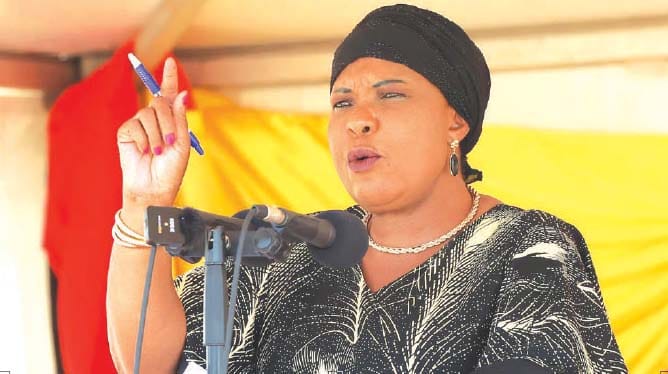Tendai Rupapa in MUZARABANI
CLEAN and readily available water is important for public health and can contribute greatly to poverty reduction.
Women and children often spend many hours every day collecting water from far away sources thus inhibiting them from working to generate livelihoods and this reduces children’s time for education because so much time is devoted to that task.
However, travelling long distances in search of the precious liquid is now a thing of the past for residents in Muzarabani district, thanks to environmental patron Dr Auxillia Mnangagwa who commissioned a 7,2km piped water scheme.
The scheme was implemented by the Utariri Integrated Biodiversity Climate and Livelihoods Programme which Amai Mnangagwa co-launched with the Swedish Embassy last year.
The programme, which is in line with the Government’s goals on biodiversity and climate change, has already started impacting lives, with the commissioning of the water piped scheme, gardening projects and nursery tree production.
The piped water scheme commissioned yesterday will serve 600 households which translates to 4 000 people, clinics and schools.
An avid conservationist, the mother of the nation was thrilled to tour Chitemamuswe tree nursery production which trains and educates the community on indigenous tree production.
Muzarabani is in Mashonaland Central Province, which is a tobacco farming area that requires renewable energy for curing.
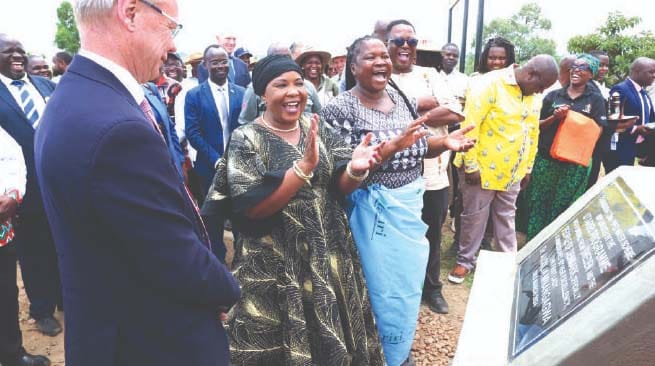
The nursery has over 40 000 trees including bird plum (munyii), kei apple (tsvoritsvoto), weeping boer bean, red mahogany, monkey bread (musekesa), sausage tree (mubvee) , munhondo, musasa and wild mango trees.
The First Lady and her delegation also toured Chitemamuswe Primary School’s thriving gardening projects where there is a solar-powered borehole which is also benefiting the community.
The projects are being implemented by the scheme.
“Involving communities in nursery tree production helps in environmental preservation. It helps ensure they protect trees from their hearts. This is commendable. Gardening also teaches children to work and removes laziness in them.
“I am happy the teachers and pupils are hands-on on this project. I have seen different types of vegetables that include tomatoes, cabbages, rape and onions,” Dr Mnangagwa could be heard saying during the breathtaking tour.
Amai Mnangagwa further led in the planting of indigenous trees and fruit trees around the school before proceeding to Chawarura where she commissioned the water scheme and addressed the community.
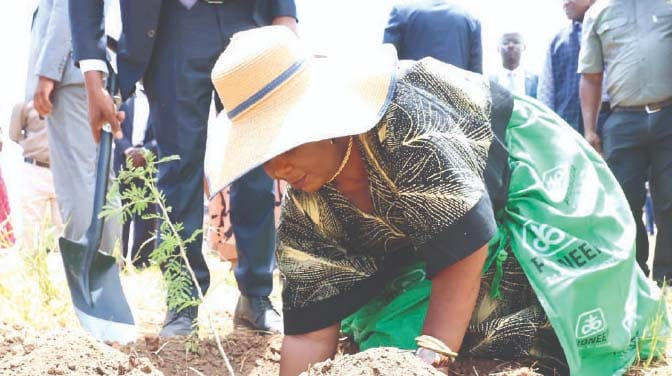
In her remarks, the mother of the nation paid tribute to the Swedish Embassy for its support and urged the community to guard the project jealously and be against vandalising it.
“Today we have come up with a water project. We all know that life depends on water. I am delighted with what I have seen today in Muzarabani and want to take this opportunity to congratulate the ambassador his excellency Per Lindgärde the Swedish Ambassador to Zimbabwe.
“The Swedish Embassy has walked with us on all our vision for the further development of our people and the country,” the First Lady said.
She gave a brief account of how it all started.
“On the 16th of March 2023 I was invited as a guest of honour to launch this programme and today I am here in Muzarabani in Mashonaland Central Province to bear witness to the foundation of the programme.
“It is pleasing to note how our respectable cooperation is being translated into projects that positively affect the lives of our people. I am happy that through our collaborative work on biodiversity and the environment, we have strengthened the relationship. If you find a relative who comes in your hour of need, that is a real relative.
“The Swedish Embassy has helped us together with those they brought along to work with us in terms of transforming and protecting our lives concerning water. Our Government is a participant in global environmental affairs and is a recipient of financial support from the global environmental facility GEF, an arm of the United Nations.
“Our Government elected to work with the United Nations Development Programme in circle number 6 of the funding known as the GEF6.
“Our ministry put a team in the implementation of a project here in the Zambezi Valley and we are proud of the work in this district aimed at the protection of our heritage and intensifying our response to climate change”
“We launched this in Harare and we discussed their wish to provide clean water in Muzarabani and today we are here. The water I saw there is amazing and is coming from the mountains to assist thousands of people,” she said.
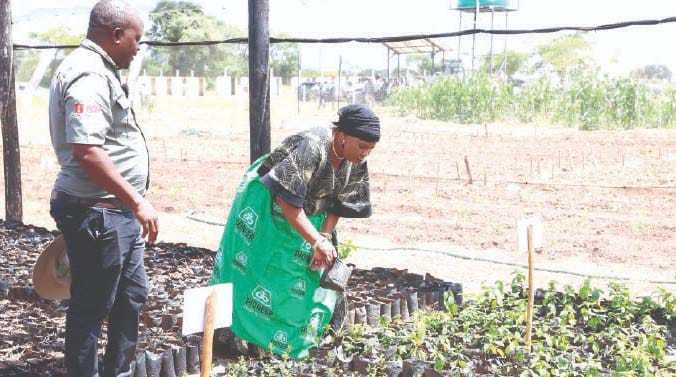
The project, Dr Mnangagwa said, was critical to mitigating the effects of climate change.
“Look at the climate change, it is not in Zimbabwe alone but the whole world over we are now in climate change. This scheme will go a long way in helping the people. There is a Presidential scheme which is drilling boreholes.
“Each province was given rigs, but we are thankful that if you get friends on one hand and the scheme on the other it means people from both sides survive.
“We now need to preserve that water and that infrastructure. How do we protect these?
“We need to take responsibility for our actions. Climate change knows no one, no politics, no race, no age, no gender and affects all of us equally.
“For this reason, we need to work together to reduce the impact of climate change through exemplary projects such as Utariri Project. In Shona, what would we say is the equivalent of Utariri?” the First Lady asked as she engaged her audience.
In response, a resident said: “It means protecting what you have. You need to protect your assets.”
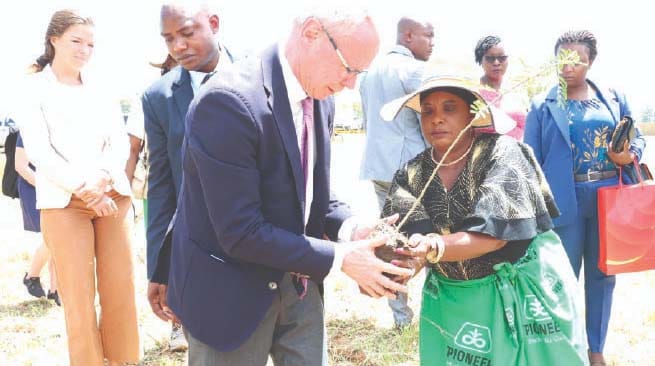
The First Lady said it was also essential to celebrate Utariri’s foundations and quest to curb human-wildlife conflict.
“We also must celebrate the foundations of Utariri, that is the Zimbabwe foundation’s work in wildlife conservation in the Sadc region. Many of you recall and still work with the Campfire communal programme for indigenous resources.
“It was a pioneering model for community-based natural resource management and Utariri borrows much of the work from this past. Utariri also covers wildlife.
“They have started a water project and extended to wildlife looking at what the Ministry of Environment is doing through ZimParks so that we stem human-wildlife conflicts. We need wildlife and they also require us.
“We must celebrate that Zimbabwe has credible biodiversity of which the Zambezi Valley is a prime example and for this, we should all take pride. I am happy that Utariri takes seriously the challenges of human-wild-life conflict.
“We have seen communities suffering due to human-wildlife conflicts and to address this challenge the Government has set up the human-wildlife conflict relief fund which will compensate for people who are killed, maimed or injured as a result of human-wildlife conflict.
“Alongside this, we welcome the human-wildlife interventions from the Utariri Programme which will ease the burden on our communities.
“I therefore want to acknowledge the leadership of traditional leaders, chiefs and headmen and district leaders who are here that help such projects and be involved,” she said emphatically.
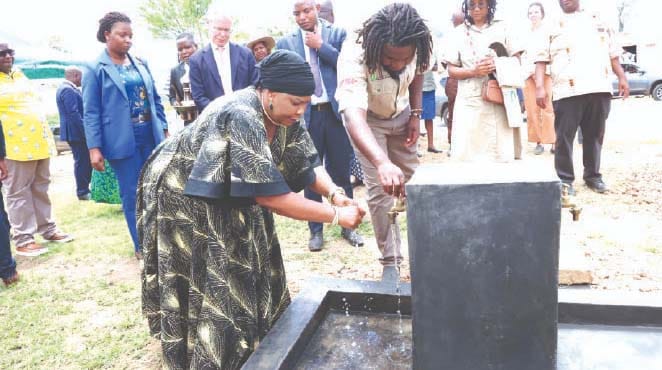
Dr Mnangagwa voiced her concern over rising cases of drug abuse in the country’s rural and urban communities.
“It would be very shameful on our part to hear that the big water project has been destroyed. We have a problem with drugs that is going on everywhere. We thought it was urban centres only, but it has also come to rural areas.
“We do not want to hear that you have vandalised that place just to break and take that to sell for a dollar so that you go and buy kambwa (illicit and potent brew). Is that sensible? Breaking a tap to buy kambwa. You would have affected everyone because of your love for kambwa,” she said.
Mr Per Lindgärde, praised the First Lady for her commitment to conserve the environment.
“The Embassy of Sweden had the pleasure of co-launching the Utariri Programme together with the First Lady as the honourable patron for environment in Zimbabwe. I would like to thank you for your commitment since the launch to ensure sustainable management of Zimbabwe’s natural resources by following up on activities implemented together with communities as part of the Utariri Programme.
“Sweden is committed to contributing to creating enabling conditions for suitable management and use of natural resources for the conservation and restoration of biodiversity as reflected in Sweden’s strategy for development cooperation with Zimbabwe 2022-2026. This commitment is demonstrated through our support to utariri empowering communities to act as incentivised custodians of the vibrant Zambezi Valley landscape,” he said.
He added that the project will go a long way in reducing human-wildlife conflict since communities can now access water without fear of coming into contact with animals at water points.
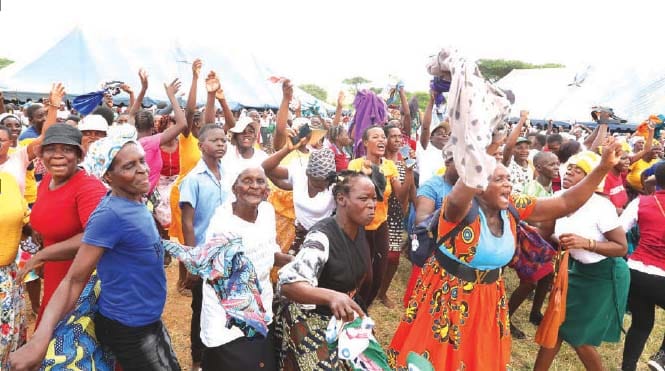
Engineer Kudakwashe Murambadoro gave a brief on how the water scheme was done.
“We saw that underground water is a challenge in this area, but there is clean water in the mountains where there are no people nor anything that may pollute the water.
“There is a spring in Bani ReMbizi and we managed to collect the water as it falls. This piped water scheme was once done around the year 2000 but it did not last long because the pipes that were used were breaking and the scheme was not being understood by the community.
“We then went round the community where people told us their aspirations and we used our skills to change the programme. We then put a sand filter and a tank. The talk holds 500 000 litres so there is a main pipe that has several taps servicing various households,” he said.
In a speech read on his behalf by his Permanent Secretary Professor Prosper Matondi, Environment, Climate and Wildlife Minister Mangaliso Ndlovu described climate change as a global matter requiring the world to work closely together for solutions.
“Climate change is a global matter. The most important thing globally is that we must all act together and we bear witness today with our Swedish friends and our Danish friends that this climate change requires all of us to be on the ground to see how we can address the challenges that all of us face.
“Today we mark the first anniversary milestone achievement after you the First Lady Dr Auxillia Mnangagwa co-launched the Utariri project together with the Swedish ambassador in Harare in 2023.
“Utariri is a Shona word meaning stewardship and is appropriate as the programme seeks to promote stewardship of our natural resources utilising them in such a manner that allows for future generations to access and to benefit from the same resources.
“This support together with projects such as this one is coming at the right time. The dry spell that we are experiencing is a true reflection of climate change and we have to act.
“I understand that this programme is being implemented in an area which is heavily affected by human-wildlife conflict, land degradation, deforestation, veld fires and above all climate change.
“These challenges are affecting the ability of this area to sustain livelihoods and this affects the achievement of our country’s goals,” he said.
Mr Walter Tizera praised the First Lady for her vision.
“I am at a loss for words because of the hard work our mother puts in her projects. She continues doing wonders for us. We were truly in difficulties because of the lack of clean water. Our wives and children would spend more time travelling long distances to fetch water, but this is surely going to be a thing of the past. We can now do our gardening projects,” he said.
Similar words were echoed by Mrs Viola Kamunda who thanked the First Lady for the water which she said will aid them in their projects, warding off diseases and ending their long walks in search of water.
“We want to thank Amai for this project. It will go a long way in alleviating our water challenges. We now have safe water to drink which means we are now safe from diseases like cholera. Our agricultural projects will also flourish. Walking long distances in search of water was chewing most of our productive time,” she said.
Mashonaland Central Provincial Affairs and Devolution Minister in a speech read on his behalf by the Permanent Secretary in his office, thanked Amai Mnangagwa for her unwavering support towards the upliftment of people’s livelihoods adding that the project is a demonstration of what can be achieved if people unite for a common goal. – Herald

